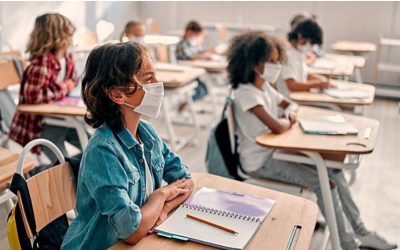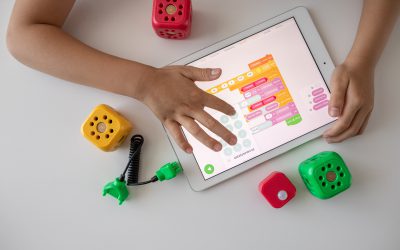The corona crisis means hard times for healthcare workers and people in other essential services. It is also a hard time for all of us in education. Teachers are busy trying to maintain the continuity of education by designing online activities and assessments. Support staff are busy trying to arrange all the underlying support so that the teaching continues. But despite all these efforts, many students seem to be switching off. In this report, Janene Pieters describes how hundreds of children in secondary education are not engaged in home-schooling. We here similar anecdotes of students in higher education who feel a sense of lost purpose: why study when there are elderly family members or neighbours who need help?
06-04-2020

How can we support and motivate students to engage in online learning?
Our research on self-determination theory offers some relevant insights which I summarize as
A – Autonomy, B – Belonging, and C – Competence
Research on self-determination theory finds that satisfying the feelings of autonomy, belonging (relatedness) and competence leads to autonomous motivation: the motivation that drives you to engage in an activity that you find interesting or worth your while, relevant or important.
Autonomy –means you do things out of choice. It does not mean doing whatever you want, but rather doing what is required for learning in your own way, in a manner that interests you. Having a sense of autonomy over your work thus helps staying motivated to learn, even in an online environment.
For teachers this means giving your students choices between the assignments you expect them to complete. But you should also allow for creativity in doing so. Allow students the flexibility to complete their schoolwork in their chosen timeframe. This does not mean that you cannot set deadlines or expect a certain quality of work. You definitely can and should. But students will respond best if you involve them in making choices about the content, nature and timing of assignments. This is best done with a group of students, as they can gently correct each other if they stray from the expected path. Being part of the decision-making makes people more committed to the outcome and persistent in their effort to achieve them. Provide a rationale for the work set. Students need to know why they need to learn something in order to learn it effectively. Remember that “Education is not the filling of a bucket, but the lighting of a fire!”.
For students: this means taking more responsibility for your learning and partnering with the teacher in making decisions about the assignments. You can also help by suggesting alternative forms of working, such as working in groups of two or three, and dividing a larger assignment into smaller components to be completed by these small groups. Working in small groups you can teach each other what you have learned and worked on. This is just one example. Your creativity knows no bounds, so use it!
But also ask your teacher about the relevance of what you are learning for your future practice or work. This can provide you with a perspective to think about. It is important to remember that “autonomy without structure = chaos” and “autonomy with structure = learning”.
Having a structure for your day is important. Waking up at your normal school time and dressing for school can help you start your day really well. Having a desk with all your learning material and resources also gives you a feeling of a normal school day. The assignments provided by your teachers daily can be planned over the next hours as you choose. The expected outcomes need to be clear. Clearing doubts and getting your teacher to answer questions will help you to be productive.
Belonging –means feeling an integral part of a group of people. In the learning context, this group comprises your classmates and your teachers. In times like these, belonging is the most important need to be fulfilled. In this age of technology, it should not be too difficult.
Teachers can create a sense of belonging by planning regular check-in session with students. Doing this in a group session can work very well, especially in a way in which you can see all the students. It is important to acknowledge students’ feelings, even negative ones.
Being patient and lending an ear is important. When students feel heard, they are more likely to concentrate on what is being taught and be more open to learning.
Exchanging news of family or discussing the latest news, for instance, can easily serve this function. Keeping a light atmosphere during conversations and creating a safe environment in which students feel free to express themselves is important.
Students need to connect with the group, teachers and even family. A few days quarantined at home can make you feel depressed and purposeless. It is important to call friends or chat with them, even play online games with them. Helping out with household chores is therapeutic and valuable for your parents who are struggling with doing their work and managing the home. Being useful to someone can really lift your spirits.
Competence – refers to feeling capable of doing a given task, such as an online activity or assignment.
Teachers can enhance a feeling of competence by handing out personalised tasks suited to the capability levels of the students. The task should be neither too easy nor too difficult. This does not mean that you cannot set complicated tasks. A complex task can be broken down into a set of smaller tasks. At the end of each component, the student will have the feeling of being competent at that level and of being ready to move to the next one. This is similar to the principles followed by gaming companies.
Students can actively manage their feeling of competence by understanding their own skills and possibilities, asking for help when needed, and mastering tasks in a graded and sequential manner. It is also important to realise that failure is a way of learning, and not a judgement of one’s capabilities. Changing the tactic to master performance is important in the case of failure. Remember “doing the same thing in the same way mostly leads to the same result”. Try something different, be creative. Be wedded to the results, not the process. Asking friends for help is also a great idea. They can probably relate to your difficulties better than a teacher can.
Use these simply guidelines as an aid memoir every day and when structuring your teaching and learning; it will help you teach and learn, even in a time of crisis.
References:
- Deci E.L., Ryan R.M. (Eds) 2017. Self-Determination Theory: Basic Psychological Needs in Motivation, Development, and Wellness. ©2017 The Guilford Press. NY, USA.
- Kusurkar RA, Croiset G, Ten Cate TJ. Twelve tips to stimulate intrinsic motivation in students through autonomy-supportive classroom teaching derived from self-determination theory. Medical Teacher 2011; 33: 978-982.
https://www.ncbi.nlm.nih.gov/pubmed/22225435
- RA, Ten Cate ThJ. AM Last Page: Education is not filling a bucket, but lighting a fire: Self-Determination Theory and motivation in medical students. Academic Medicine 2013; 88(6): 904.
http://www.ncbi.nlm.nih.gov/pubmed/23708603#!
- selfdeterminationtheory.org
- LinkedIn – Center for Self-determination Theory
- Twitter – @centerforSDT
See also information for:
Most recent blogs:
How LEARN! supports primary and secondary schools in mapping social-emotional functioning and well-being for the school scan of the National Education Program
Jun 28, 2021
Extra support, catch-up programmes, learning delays, these have now become common terms in...
Conference ‘Increasing educational opportunities in the wake of Covid-19’
Jun 21, 2021
Covid-19 has an enormous impact on education. This has led to an increased interest in how recent...
Educational opportunities in the wake of COVID-19: webinars now available on Youtube
Jun 17, 2021
On the 9th of June LEARN! and Educationlab organized an online conference about...
Homeschooling during the COVID-19 pandemic: Parental experiences, risk and resilience
Apr 1, 2021
Lockdown measures and school closures due to the COVID-19 pandemic meant that families with...
Catch-up and support programmes in primary and secondary education
Mar 1, 2021
The Ministry of Education, Culture and Science (OCW) provides funding in three application rounds...
Home education with adaptive practice software: gains instead of losses?
Jan 26, 2021
As schools all over Europe remain shuttered for the second time this winter because of the Covid...





